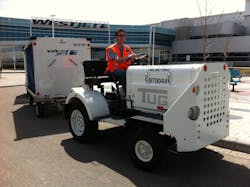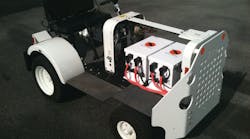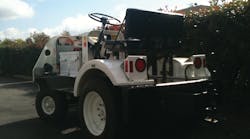WestJet showcased its newest environmental solution, a baggage tug which runs on rechargeable lithium polymer batteries.
As part of a pilot project, the Company said the airline worked alongside Corvus Energy, a Richmond-based technology company, to re-engineer the tug to be powered by lithium polymer batteries, removing the need for any fossil fuel to power the equipment. The tug, which began operating in October at Calgary International Airport, successfully performed in frigid temperatures, without incident, throughout the winter.
"Implementing this new technology is a key part of our ongoing commitment to environmental sustainability," said Cam Kenyon, WestJet Executive Vice-President, Operations. "As an airline, we believe in investing in new ideas that will help keep our maintenance and fuel costs low, which in turn allows us to continue to deliver low fares and high value to our guests."
"The successful integration of Corvus Energy's lithium ion battery systems into WestJet's ground support equipment represents a tremendous validation of our technology," said Brent Perry, chief executive officer of Corvus Energy. "The introduction of a lithium ion GSE solution is a significant development for the aviation sector in terms of environmental impact and worker safety and we're pleased to be at the forefront."
Airlines have been wanting to enhance electric units for many years said Perry. "To date, our solution is the only battery technology that requires no maintenance, works in extreme cold or hot temperatures, as well as charging faster and outlasting the incumbent technology. It represents a major advance in the aviation industry with massive market potential."
The change to electric power has allowed the airline to continue its focus on on-time performance, as baggage can be transported to and from the aircraft on approximately 11 flights per day on a single charge.
In May, the Company noted that two electric baggage tugs will arrive in Erik Neiesen Whitehorse International Airport for the launch of daily service to the area, which begins May 17. The airline expects the technology to be effective in the Yukon's cold weather temperatures where lead-acid batteries are prone to freezing and cannot be recharged once frozen, and where gas-powered tugs are not permitted in the airport's ground-level baggage areas.
According to a release, environmental solutions are part of WestJet's commitment to responsible growth. In November 2011, WestJet attained gold certification under the Leadership in Energy and Environmental Design (LEED) program for its Calgary campus. WestJet's greenhouse gas environmental policy focuses on investing in fuel-efficient jet aircraft and technology to maximize operating efficiently and safely. Between 2000 and 2010, the airline improved fuel efficiency by 43.4 per cent, per liter, per revenue ton kilometer, resulting in fuel savings equivalent to the amount of fuel used fly from Calgary to Toronto and back 34,700 times.
WestJet is an airline offering scheduled service throughout its 76-city North American and Caribbean network.
((Comments on this story may be sent to [email protected]))
Copyright 2012 Close-Up Media, Inc.All Rights Reserved




